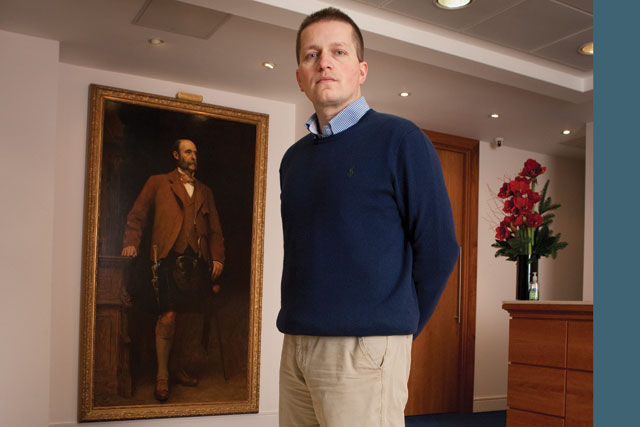From a City perspective, media in 2011 was all about Murdoch and/or News Corp and/or BSkyB. Who could have imagined at the start of the year that News of the World would have closed? Or that the furore over phone-hacking might cause (at least in the short-to-medium term) News Corp's plans for full-scale ownership of BSkyB to be put on ice?
On a related note, the Leveson inquiry and other parallel procedures are ongoing as we go to press. Quite possibly, they will be ongoing this time next year. Navel-gazing is the order of the day, and the media sector likes nothing better than analysing the media sector! And this, of course, includes the press. Commercially, the chaos on Fleet Street does open up opportunities for red-top publishers hitherto obscured by the might of News International. This will play out in 2012.
While the market share opportunity in traditional print media might be up for grabs, the truth is that advertising in this sector continues to contract. Advertising is the lifeblood of the media sector, and expectations on advertising in 2012 likely to be the single biggest driver of profit forecasts. The City is obsessed by all sorts of numbers, and in particular profits.
In 2012, most industry forecasters expect UK ad growth of 2-3 per cent. This will lag global ad growth of 4-5 per cent, which will be driven by those highly attractive BRIC markets. Markets that we once called "emerging" in a slightly patronising way have now emerged and offer the sort of high-growth consumer societies that we in the West can only dream about. Here, consumers remain under the cosh.
However, closer to home, 2012 sees London host the Olympics. And we expect this to be a serious marketing bonanza for all-comers and to shed a positive light on the UK too. The BBC is the host broadcaster; however, ITV - and commercial TV in general - is likely to be a big winner from the Olympics. The BBC, of course, does not carry advertising. Historically, the host market (in this case, the UK) has seen a big uplift to advertising as corporate sponsors focus their marketing spend around the Olympics. We anticipate the Olympics could add as much as 3 per cent to overall UK TV advertising in 2012, some of it diverted from other media.
And if the thought of skin-tight lycra and synchronised swimming doesn't do it for you as a viewer, then Euro 2012 footy takes place beforehand. This, again, qualifies as one of Sir Martin Sorrell's famed quadrennials, which should help ensure 2012 is a decent year for advertising and marketing growth, in spite of the tough outlook for the economy. As an aside, our own professional interest has been drawn to agencies that are exposed to sports marketing specifically (such as Chime). We see sports marketing as having good, international growth drivers well beyond this year.
If commercial media should benefit from big sports events in 2012, then it should also benefit from relative weakness at the BBC where, for the first time in a generation, there are serious budget cuts going through, which may impact programming in TV, radio and online. This begins to create a level playing field for the media sector as whole, though none of us wants to see the BBC denuded.
It's hard to write about the City and the outlook for the media sector in 2012 without touching upon the wider economy. First, the obligatory glass-half-empty comments: recent developments in the eurozone are clearly unsettling and, in the UK, economic growth forecasts have been cut for a few months now. Availability of credit for smaller businesses also remains very patchy, and this is bad news for media entrepreneurs everywhere.
Now the more interesting glass-half-full comments: nearly all major UK media corporates are in a much stronger position now than in 2008, when the economy last threatened to roll over. In the City, we gauge this by looking at boring things such as balance sheets, debt and dividends. These all look robust now. The sector, likewise, is further down the path in terms of deriving paid-for online revenue from its customers, whether businesses or consumers. The internet is no longer the threat it was once perceived to be.
So, overall, we view 2012 as a sort of "muddle through" year, without too much help from the economy. And with the big companies in fine shape generally. We expect successful investments to be situations where companies proactively exit businesses that may be non-core, or improve focus where they have a clear competence. For this reason, we expect there to be a fair number of industry mergers and acquisitions and asset swapping.
A good template for this might be Aegis Group, the owner of Carat and Vizeum, among others. In 2011, it proactively exited Synovate, its market research division, where it did not identify much upside. As a result, it is more focused on media and digital, with a positive impact on its share price performance.
In the US - and in spite of the choppiness in 2011 - the initial public offering market was fairly hot, with listings from the likes of LinkedIn, Renren and Groupon. Social media remains an attractive space, and investors will pay a premium for even unproven business models. This will remain the case in 2012. Meanwhile, my personal quest is to find UK-centric social media assets to meet this demand.
Returning to our starting theme of Murdoch and the travails of 2011, one of the ironies of the whole BSkyB saga is that the underlying company is performing superbly. In terms of the subscriber base and the quality of the proposition, it just gets better and better. In reality, however, a fresh approach by News Corp for the majority stake it doesn't already own looks some way off.
Alex DeGroote is a media analyst at Panmure Gordon & Co.


